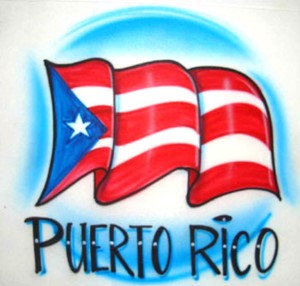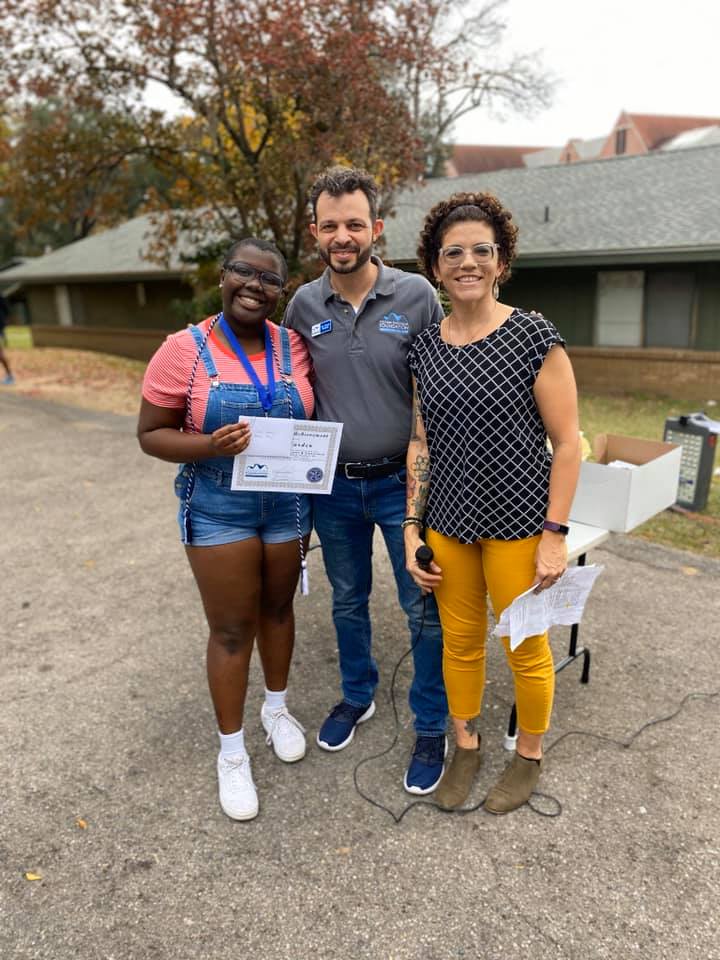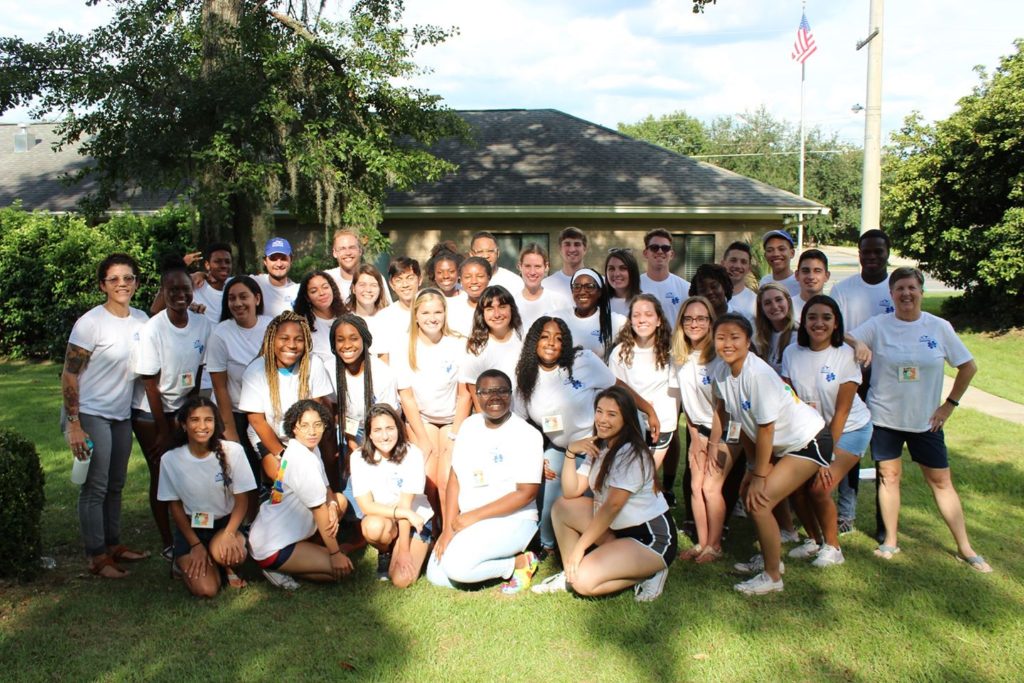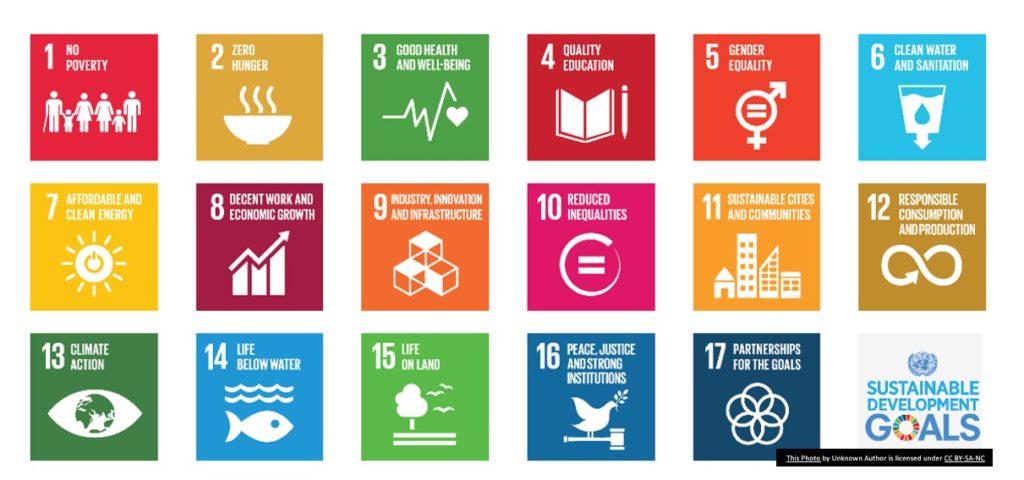I was fortunate to meet Dr. Liovani Nazario during an immersion experience at the River Phoenix Center for Peacebuilding in Gainesville, Florida in October 2019. As you'll see and hear, Liovani’s story is a unique and inspired example of “Homegrown Solutions for a Patchwork World”. Her life resonates with clear themes of fairness and inclusivity. With a strong role model in her mom, she starts by telling us about her roots in Puerto Rico that led her to a life of service. The second half of our conversation moves to her current work with college students and her perspective on what it means to be a changemaker.
Homegrown Liovani
Liovani was born and raised in Puerto Rico and spent the first half of her life there. In her twenties, she moved to Tallahassee, Florida for graduate school at Florida State University and has lived in that area ever since. She travels home to Puerto Rico every year to see her family and describes herself as “100% Puerto Rican”.
It’s a huge part of who I am because I was there half of my life and most of my family is still there. It’s who I am, how I treat people, how I am, the person I am, how I cook, how I talk, how I express myself.
Being Puerto Rican helps her see the world “with another set of eyes”. She often looks at situations considering “how the people in Puerto Rico see…or feel… an event or a catastrophe or a virus.”
Her description of how she grew up gives us a window into where she developed her strength and determination.
I was raised with my mom, which was really my grandmother. My grandmother adopted me when I was born because my biological mom was very young . . . I was raised with her and then my biological mom and my biological aunts as my sisters . I knew who I was, but it was just this house full of women…I think I get a lot of who I am, my strengths, because all these women were so strong and just knew what they wanted and went for it…The people that I had around me when I was born were these strong, awesome, beautiful Puerto Rican women just doing what they want to do… They just went for it!
Her sense of fairness developed early on. She says the question, “How do we make things fair for everybody?” was often in her head.
I was always in that set of mind of “Why is this group of people being treated like this?”
Her mom was an ever-present reminder of what it means to live a life of service. After a career as a teacher and librarian, she volunteered regularly at her church, the hospital and community organizations. Liovani says her mom never complained about the work in the slightest. She seemed to have a need to live in service. The importance of helping others rubbed off on Liovani and became a big part of her own value system.
She takes great joy in her family, too. India, Liovani’s 18 year old daughter, is currently home from college taking classes online because of the Coronavirus. Though India may not be quite as happy about the situation, Liovani fully admits enjoying having her back under her roof for this time. She’s creating that same sense of what it means to be a strong independent woman for her own daughter.
Liovani's Patchwork
Liovani’s family is a patchwork unto itself. She describes this as very representative of Puerto Rico as a whole.
There's a lot of color diversity because Puerto Ricans look in such a big spectrum. If you see just my siblings… I look maybe like the most ‘Puerto Rican’ of all of us. Then my sister is extremely white with green eyes and red hair… And then my youngest brother is black with dreads. So we're just like this beautiful rainbow already just in my family.
She says that this is quite typical in Puerto Rico. The spectrum of appearance is broad.
But at the end of the day, we're all Puerto Rican. The island is our common ground.

Though her family dynamics were different from many in her community, diversity in general was welcomed and comfortable for Liovani while at home in Puerto Rico.
It was when she moved to the United States mainland that she became more aware of diversity and what it could mean for minorities.
I am a minority here. I think the dynamics of me seeing what diversity meant, changed with the culture shock. You are treated in a different way, not by everybody, but sadly by a lot of people.
This treatment steered her toward more interactions with other minority groups because it seemed to be easier. That “fairness factor” that always rang in her ears began to be a continuous theme as she started to see, feel and hear the inequities first hand.
Over time, working for fairness and equity has become a guiding theme in all that she does.
SOLUTION-FOCUSED LIOVANI
Liovani came to the U.S. and earned a Ph.D. in Education with the intention of returning to teach in a college back home. Life plans changed as they are apt to do. She took a job working at a nonprofit agency called “2-1-1” because they needed someone who was bilingual to work with Spanish speaking clients.
She credits her role there, first as a crisis counselor and later as an administrator, with “starting everything” for her.
It was the first time she says she was really working to help people. As a crisis counselor, she took calls from people with basic needs for things like food, housing and childcare as well as from people in life-threatening situations including threats of suicide.
In this position she developed counseling skills that have served her well in every role she’s had since.
That job just changed me because I got to experience the real needs out there and how we think the world is working in one way; there's Medicaid, there's food stamps, there's this, there's that. And then when you talk to the people and when you work with them (you realize), no, some people are not eligible for that. Even if they are, they still can't pay rent…That just opened my eyes to the things that are needed out there that people don't know.
One of the most profound realizations for Liovani was how much people often just need to be heard.
That was huge for me to learn because sometimes when you're thinking about counseling or being a good listener, you are thinking you have to say something back … You have to tell them what to do. In reality, people just want to be heard. They don't even care if you say anything back… Any job that I've had after that, I do have to thank that 2-1-1 job… It gave me my ground, my basis. …my education… learning the needs and learning how to help.
After 2-1-1, Liovani opened her own business as a fitness trainer. This role allowed her to pursue her passion for physical fitness. She soon discovered that what she loved most was “helping women to feel better about themselves.” She loved seeing her clients feel empowered to do things they didn’t think possible.
After about three years in her own business, she was offered a position that seemed to bring her passions and skillsets together in a very special way. The Oasis Center for Women and Girls offered programs such as a support group for single moms, counseling and a camp called “Girls Can Do Anything.” Once again working in a nonprofit setting, she was reminded how much need exists. She also had to acknowledge that she couldn’t help everybody with every need. What she could do was listen and let these women and girls know that they are seen and they are heard.

When they see that you are seeing them, that you are there for them for real, it changes everything. You see it on their faces.
They made that connection with me. I made time for them. I made them feel important. I made them feel like they were someone ,that I care for them. …Just being there for that person made a little bit of a difference in that person's life.
Her work at 2-1-1 taught her that. Her work as a personal trainer and at Oasis validated it.
Liovani’s skills as an empathic listener and resource have been her strongest assets in her newest position as well. For the last year, she’s been working at the Southern Scholarship Foundation (SSF) to help college students who are in need of housing. SSF provides rent-free housing for low income students who have the academic skills needed to attend various universities.
She feels like each of her previous positions has prepared her for what she’s doing now. SSF at Florida State has sixteen houses for the 300 students they serve. The houses currently hold from 17 to 27 students each.
Liovani loves working with college students and has found great reward in building a trusting relationship that allows them to come to her for support when they need it. She chuckles as she recognizes that sometimes she’s so good at listening that students are constantly coming to her. It can sometimes interrupt other parts of her job, but, in truth, she knows this may be the most important thing she does.
They feel like I'm listening. They feel like I'm seeing them and they feel heard. It’s so ‘basic’, but because of that, then they tell you more things…It again goes to that basic need of every human being.

It’s in this setting that the extra skills she developed at the River Phoenix Center for Peacebuilding have proven so very useful.
When students in their late teens and early twenties suddenly have to share a home with dozens of others, conflicts naturally arise.
They have no idea how to deal with conflict this complex. It just goes sometimes to levels they don't need to.
Restorative Justice practices have multiplied her effectiveness in scenarios involving more than one person. She was already quite competent in working one-on-one and had good skills with groups as well, but new strategies in her toolbox are always put to good use. Restorative Justice has built her confidence in helping students resolve their conflicts successfully in ways that make sure everyone is heard.
Once she started using restorative circles, she was immediately pleased with how well they work. She’s implemented the strategy with positive results. Afterwards, she surveys the students to document the level of success they feel as well. Her hope is to keep putting the strategies to good use and collecting data on successes to be ready to share with other agencies that could use this approach. This includes the SSF office in Gainesville. She believes a lot of folks learn about RJ only in the context of the juvenile justice system and don’t recognize how useful it can be for “lower level” conflicts as well. Liovani is working to change that.
Even when individuals aren't involved in a direct conflict, Liovani sees the usefulness of restorative circles as a tool for inclusive communication. In working with her colleague at the Gainesville office on the needs of their students, it has come to their attention that residents in the LGBT community sometimes aren’t feeling well represented and heard in the community.
This was surprising at first.
My door is full of pronouns…We knew we were doing it for ourselves… but it was not enough for them to feel included in our community. So learning the circles…led me to want to start an “LGBTQ Chat.”

The Chat is a place for their LGBTQ community to come to talk about issues that arise in a relaxed environment where they will be seen and heard. Liovanni’s specialty!
They need to see others in the community that are LGBTQ. They're young and they're coming into our houses that are male or female. For someone that is non-binary or someone trying to identify themselves, (this can be hard).
Usually in a house of females, they're talking about boys…In a house of males , they're going to be talking about girls. It's not very inclusive.
Once we started thinking about it, we started having conversations with the students.
We also started reaching out to a friend of mine that knows a lot about working with the LGBTQ community and policy.
This friend is going to help rework the policy manuals, procedures, handbooks, and language practices for the agency. This, along with the RPCP Restorative Justice training, helped Liovani feel ready to get started with the Chat group in the fall.
She’s proud that they “are really doing what (they) preach”. Her hope is for her counterpart in Gainesville, Teresa, to go through the RPCP Immersion program this year as well.
CHANGEMAKER LIOVANI
Liovani ends our conversation by talking about what it means to be a changemaker.
At first she said she didn’t think of herself as a changemaker. That word made her think of “people that are more seen and people that are doing things on the grand scheme of things.” She gives Author and Activist, Rivera Sun, (also interrviewed for this Changemaker Series) as one example.
As she reflects further though, she muses, “ But then all those people cannot do everything and while you're doing things on the big spectrum, you have to have all these people doing the work in the community. I guess I am a change maker.”
You are change makers as long as you're doing something that is influencing in a positive way other people's lives; as long as you're doing something to make changes. Maybe not directly, maybe you're changing policies, maybe you are changing laws that will help them…then you are a change maker.
It's like a puzzle. You need all those little puzzle pieces to be able to do the whole work..
Like Liovani, many have been the beneficiaries of RPCP as we strive to find our piece of that puzzle. You can learn more about their work here and find out how you, too, can help to build a more peaceful, just and equitable world.

Liovani is a changemaker working to change the way the world works for people, one individual and group at a time, one injustice and misunderstanding at a time.
If you look at the list of the United Nations Sustainable Development Goals below, I'm sure you can see how she's working on #1 No Poverty, #3 Good Health and Wellbeing, #4 Quality Education, #5 Gender Equality, #10 Reduced Inequalities and #16 Peace, Justice and Strong Institutions. Have I missed any?
What about you? What changes are you working on to create a world that works for all? We'd love to hear from you with a message below.

Podcast: Play in new window | Download
Subscribe: Spotify | iHeartRadio | Email | TuneIn | Deezer | RSS | More


